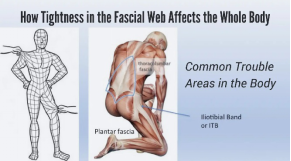Physical Therapy Info Health Tips
Our Integrated Physical Therapy blog, your go-to source for physical therapy articles and holistic health information. We provide expert insights, practical physical therapy tips, and the latest developments in the field. Whether you're recovering from an injury, managing chronic pain, or looking to improve your overall well-being, our physical therapy blog covers a variety of helpful topics.
Our goal is to empower you with the information you need to take an active role in your health and recovery. Ready to schedule an appointment and take control of your health? Contact Integrated Physical Therapy at 305-967-8976.
Understanding the Myofascial Web: A Comprehensive Guide

The myofascial web or Fascia is a critical yet often overlooked component of our body's anatomy, playing a pivotal role in our overall health, wellness, and movement efficiency. This extensive network of connective tissue, which envelops, supports, and interconnects muscles, bones, and organs, is fundamental to the body's structure and function
The Significance of the Myofascial Web
Myofascial tissue, composed of collagen fibers suspended in a gel-like matrix, extends throughout the body in a three-dimensional web. It is not only vital for maintaining structural integrity but also for facilitating smooth and efficient movement patterns. This interconnected system allows for the transmission of forces and the distribution of stress throughout the body, highlighting its importance in movement and posture.
Fascia's Role in Health and Movement

Fascia's elasticity and tensile strength contribute to its ability to absorb and distribute mechanical forces. This adaptability not only supports the body's structural integrity but also plays a key role in movement and flexibility. Properly functioning fascia allows for smooth, coordinated movements, whereas restrictions in the fascial system can lead to discomfort, decreased range of motion, and increased risk of injury.
Myofascial Pain and Dysfunction
Myofascial pain syndrome (MPS) is a common condition characterized by chronic pain arising from trigger points within the myofascial tissue. This pain can be localized or referred and is often associated with muscle tightness and sensitivity. Understanding the triggers and treatment options for MPS is essential for managing and alleviating this condition.
Treatment and Management of Myofascial Issues

Various techniques and therapies are available for addressing myofascial pain and dysfunction. These include myofascial release (MFR), a manual therapy technique aimed at relieving tension and restrictions in the fascia. Trauma, inflammatory responses, and/or surgical procedures create Myofascial restrictions that can produce tensile pressures of approximately 2,000 pounds per square inch on pain sensitive structures that do not show up in many of the standard tests (x-rays, myelograms, CAT scans, electromyography, etc.)
The use of Myofascial Release allows us to look at each patient as a unique individual. Our one-on-one therapy sessions are hands-on treatments during which our therapists use a multitude of Myofascial Release techniques and movement therapy. We promote independence through education in proper body mechanics and movement, through the enhancement of strength, flexibility, and postural and movement awareness.
The Importance of Hydration and Nutrition
Hydration and nutrition play a pivotal role in maintaining the health of the myofascial system. Adequate water intake ensures the fascia remains pliable and elastic, while a balanced diet provides the necessary nutrients for tissue repair and maintenance. E mphasizing the importance of these factors is key to promoting optimal myofascial health.
mphasizing the importance of these factors is key to promoting optimal myofascial health.
Exercise and Myofascial Health
Regular exercise, particularly activities that incorporate stretching and flexibility work, is beneficial for maintaining the health of the myofascial web. Techniques such as yoga and Pilates emphasize body awareness and the importance of the fascial system in movement, offering valuable tools for enhancing myofascial function and overall wellness.
The myofascial web is a fundamental yet underappreciated component of the human body, integral to our structure, movement, and well-being. By fostering a deeper understanding of this complex system and incorporating practices that support myofascial health, individuals can enhance their physical function, alleviate pain, and improve their overall quality of life. Emphasizing the importance of this interconnected network is crucial for promoting a holistic approach to health and wellness.


